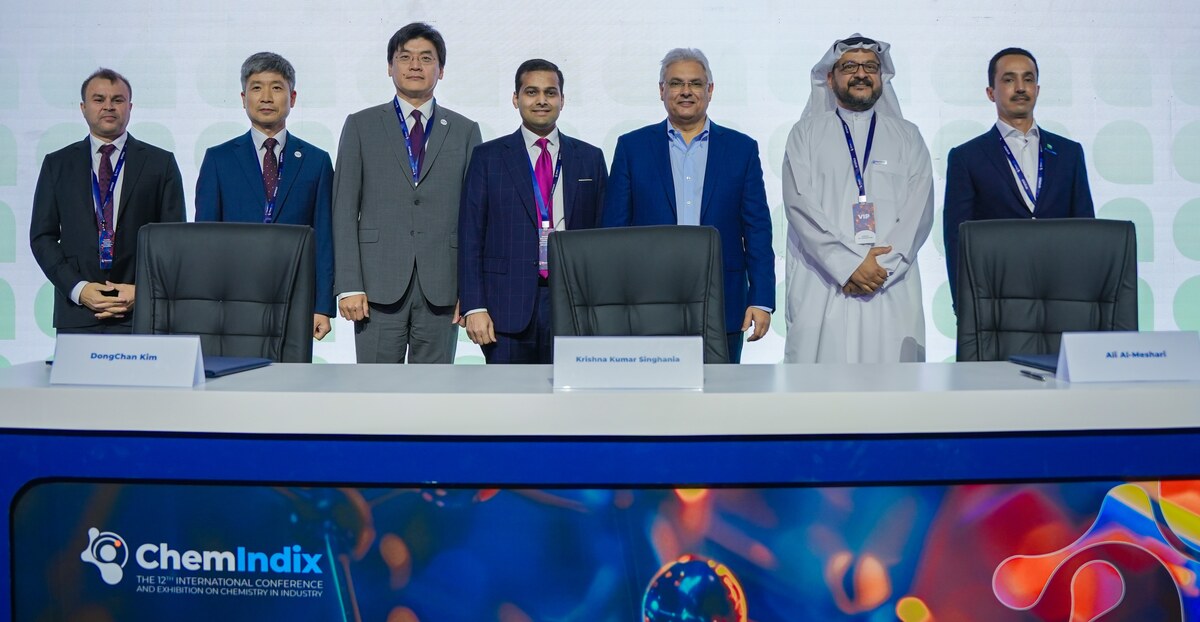RIYADH: Saudi energy giant Aramco has signed a shareholders’ agreement with Linde and SLB to advance the development of a major carbon capture and storage hub in Jubail,
Under the agreement, Aramco will hold a 60 percent equity stake, with Linde and SLB each owning 20 percent, according to a press release.
Located in Saudi Arabia’s Eastern Province, the project is set to be among the largest of its kind globally. It marks a critical step toward Aramco’s emission mitigation goals and aligns with its 2035 interim climate objectives.
Phase one of the hub aims to capture and store up to 9 million tonnes of CO2 annually, with construction expected to be completed by the end of 2027. Future phases will further expand its capacity.
“CCS plays a critical role in furthering our sustainability ambitions and our new energies business. This announcement represents a step forward in delivering on our strategy to contribute to global carbon management solutions and achieve our emission mitigation goals,” said Ashraf Al-Ghazzawi, executive vice president of strategy & corporate development at Aramco.
He added: “Aramco’s collaboration with SLB and Linde demonstrates the importance of global partnerships in driving technological innovation, reducing emissions from conventional energy sources and enabling new, lower-carbon energy solutions.”
The executive noted that the CCS hub was among several programs that would enable them to meet the rising demand for affordable, reliable, and more sustainable energy.
The initiative supports Aramco’s broader ambition to achieve net-zero Scope 1 and Scope 2 greenhouse gas emissions across its wholly-owned operated assets by 2050, as well as its interim target to reduce upstream carbon intensity by 15 percent by 2035.
Oliver Pfann, Linde’s executive vice president for Europe, the Middle East and Africa, noted the project’s significance to Saudi Arabia’s climate goals. “Carbon capture and sequestration is essential for achieving the Kingdom’s emission reduction targets. Linde is proud to collaborate with Aramco and SLB, contributing Linde’s innovative technology and experience in delivering world-scale decarbonization projects,” he said.
Announced during the Saudi Green Initiative Forum in Riyadh, the project reflects Saudi Arabia’s commitment to achieving its 2060 net-zero target.
Phase one will capture CO2 from three Aramco gas plants and other industrial sources. The CO2 will be transported through a pipeline network and stored in a saline aquifer, leveraging the region’s geological capacity for carbon storage.
Gavin Rennick, SLB’s president of new energy, highlighted the hub’s potential to reduce emissions. “Leveraging our proven portfolio of CCS technologies and extensive experience in complex CCS projects around the world, we are confident that SLB will play a critical role in advancing this important initiative. This project aligns perfectly with our commitment to industrial decarbonization, and we look forward to collaborating closely with Aramco and Linde to make it a success.”
The hub also complements Aramco’s blue hydrogen and ammonia initiatives, reinforcing its efforts to support a circular carbon economy and contribute to the Kingdom’s energy transition.
Pilot carbon capture technology
Saudi Aramco has also signed an agreement with Carbon Clean and SAMSUNG E&A to pilot a new carbon capture technology targeting CO2 emissions from natural gas turbine exhaust streams.
The initiative will utilize Carbon Clean’s CycloneCC technology, designed to capture CO2 from exhaust gases with around 4 percent CO2 content.

(From left to right): Krishna Kumar Singhania, chief growth officer, Carbon Clean; Cheon Hong Park, executive vice president, sustainable solutions business division, SAMSUNG E&A; DongChan Kim, vice president and managing director, SAMSUNG E&A; Aniruddha Sharma, chair and CEO, Carbon Clean; Mohammed Al-Qahtani, downstream president, Aramco; Ahmad Al-Khowaiter, executive vice president, technology & innovation, Aramco; Ali Al-Meshari, senior vice president of technology oversight and coordination, Aramco. Supplied.
CycloneCC features a modular design and a footprint 50 percent smaller than traditional systems. If proven effective, it could lower the total installed cost of carbon capture by up to 50% while maintaining efficiency even with low CO2 concentrations, according to a press release.
“I am excited about this collaboration with Carbon Clean and Samsung to demonstrate this promising new technology in one of our facilities. If successful, this demonstration will pave the way for the wider deployment of this technology with partners in the Kingdom and beyond,” said Ali Al-Meshari, senior vice president of technology oversight & coordination at Aramco.
Aniruddha Sharma, chair and CEO of Carbon Clean, expressed pride in strengthening the company’s relationship with Aramco and Samsung Ventures, noting that both are already investors in Carbon Clean.
“This first-of-a-kind deployment capturing very low concentrations of CO2 is a key milestone in scaling up and commercializing CycloneCC. Its compact, modular design should be easily integrated with gas turbines, delivering high-performance carbon capture in an industrial setting where space is typically limited,” he said.
SAMSUNG E&A will handle the engineering, procurement, and construction of the plant. The unit will be installed on the exhaust gas stack of a sales gas compressor turbine, with the trial providing critical data on its real-world performance.
“This project aligns with our mission to deliver innovative solutions that help industries reduce their environmental impact. With the successful execution of the demonstration, I hope that SAMSUNG E&A contributes to Aramco’s carbon reduction ambition, including future scale-up,” said Cheon Hong Park, executive vice president and head of the sustainable solutions division, SAMSUNG E&A.
The project represents a step toward making carbon capture more accessible and efficient.

























